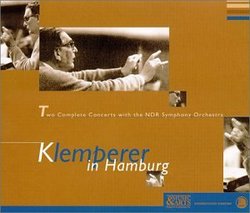| All Artists: Ludwig van Beethoven, Johann Sebastian Bach, Wolfgang Amadeus Mozart Title: Klemperer in Hamburg: Two Complete Concerts with the NDR Symphony, Bach, Mozart, Bruckner Members Wishing: 0 Total Copies: 0 Label: Music & Arts Program Original Release Date: 1/1/2006 Release Date: 1/1/2006 Genre: Classical Styles: Forms & Genres, Suites, Historical Periods, Classical (c.1770-1830), Modern, 20th, & 21st Century, Symphonies Number of Discs: 3 SwapaCD Credits: 3 UPC: 017685108822 |
Search - Ludwig van Beethoven, Johann Sebastian Bach, Wolfgang Amadeus Mozart :: Klemperer in Hamburg: Two Complete Concerts with the NDR Symphony, Bach, Mozart, Bruckner
 | Ludwig van Beethoven, Johann Sebastian Bach, Wolfgang Amadeus Mozart Klemperer in Hamburg: Two Complete Concerts with the NDR Symphony, Bach, Mozart, Bruckner Genre: Classical
|
Larger Image |
CD Details |
CD ReviewsKapellmeister Klemperer in Hamburg Thomas F. Bertonneau | Oswego, NY United States | 08/06/2001 (4 out of 5 stars) "The Orchestra of North German Radio in Hamburg came into being under Allied supervision during the reconstruction of Germany after World War Two. The victorious powers understood the centrality of music to German cultural life and saw the opportunity to foster great good will by reestablishing concert-programs and regular broadcasts, while employing musicians who had shown a clean bill of political health in the de-Nazification hearings. The Orchestra of North German Radio recorded one of the most celebrated of classical music broadcasts - the 1951 performance of the Brahms First Symphony under Wilhelm Furtwaengler. The Orchestra's permanent director for twenty years, Hans Schmidt-Isserstedt, shaped his players from early raggedness into a thoroughly competent band, capable in a wide repertory, including Mahler. The boxed set from Music and Arts presents performances with the orchestra under the guest direction of Otto Klemperer. These comprise separate concerts from 1955 and 1966. We hear a lively, musically incorrect performance of Bach's Suite No. 3, an energetic Beethoven Seventh, two muscular-lyrical Mozart symphonies (A-Major [K 201] and G-Major [K 550]) and a particularly supple Bruckner Seventh. Mozart's K 550 and Bruckner's Seventh come from the 1966 concert. The set spreads the items over three discs. (At fifty minutes, Disc 2 is on the skimpy side.) Klemperer's Bach always rewards. Although, among his contemporaries (Walter, Abendroth, Furtwaengler), Klemperer most satisfied the criteria for a modern, as opposed to a romantic, interpreter, his Bach remained decidedly nineteenth century, with a fairly large body of strings. I like the performance; it's gutsy and athletic. So too the Beethoven Seventh, which boasts an especially well-calculated Allegretto. Both sound and ensemble improve in the 1966 concert, in warm, spacious monophonic broadcast acoustics. (It's not a complaint - but one would have thought that German Radio would have been employing stereo by the mid-1960s. They had pioneered it during World War Two.) Klemperer brings out a surprising largeness in Mozart's G-Minor Symphony. I agree with the booklet that this Bruckner Seventh is better, despite not being in stereo, than the one that Klemperer recorded with the New Philharmonia for EMI around the same time. Music and Arts has always offered an interesting product. In recent years they have really upgraded the presentation. The booklet is informative and attractive; so is the box. The discs are all imprinted with Klemperer's beaky likeness leaning over a score at rehearsal. Recommended." Rough and ready playing, but total conviciton on the podium Santa Fe Listener | Santa Fe, NM USA | 12/12/2005 (4 out of 5 stars) "Music and Arts is charging an outrageous price for 3 CDs of radio material, of which only half is in decent mono (the 1966 concert). The 1955 sonics are murky, with the microphone shoved down the bell of the first horn. Musically, the only disappointment begins CD 1: a massive Bach 3rd Suite, typical of Klemperer's paleolithic ways in the Baroque (I love his Bach choral works but feel stifled by the purely orchestral ones.) The following Beehotven Seventh is a familiar piece of work, steady and grand, with unapologetic breadth to every movement. Klemperer's studio version is much the same but far better played and recorded.
CD 2 gives us a lovely Mozart 29th, as engaging as Klemperer's studio recording but more sprightly in tempo; only the muzzy sound keeps it from being a thoroughly enjoyable listen. Sonics improve dramatically with a Mozart Sym. 40, the first item from 1966. Tempos are quite deliberate, even in the outer movements, but that's Klemperer's way, and when it came to Mozart he made it work through sheer musical presence. The scale is as big as Brahms, even so. CD 3 is devoted to the main attraction, a Bruckner Seventh from 1966 in full mono sound, very listenable despite too much brightness in the fortes. The Hamburg orchestra can't play the work perfectly--or even adequately at a few junctures--but from the initial ecstatic statement of the opening theme we are aware that they feel inspired. Every phrase is intensely felt, and Klemperer's tempos are up to speed (at 63 min. this performance is 5 min. faster than Karajan on EMI). Klemperer's approach is rough-grained enough so that the blemishes mostly don't show, and his total conviction conveys full mastery of the score. Overall, I immensely enjoyed the Bruckner and the Mozart symphonies (as heard through the murk in the K. 201). If M&A had winnowed out those performances and sold them at mid-price, this would be a very welcome release. " |

 Track Listings (9) - Disc #1
Track Listings (9) - Disc #1